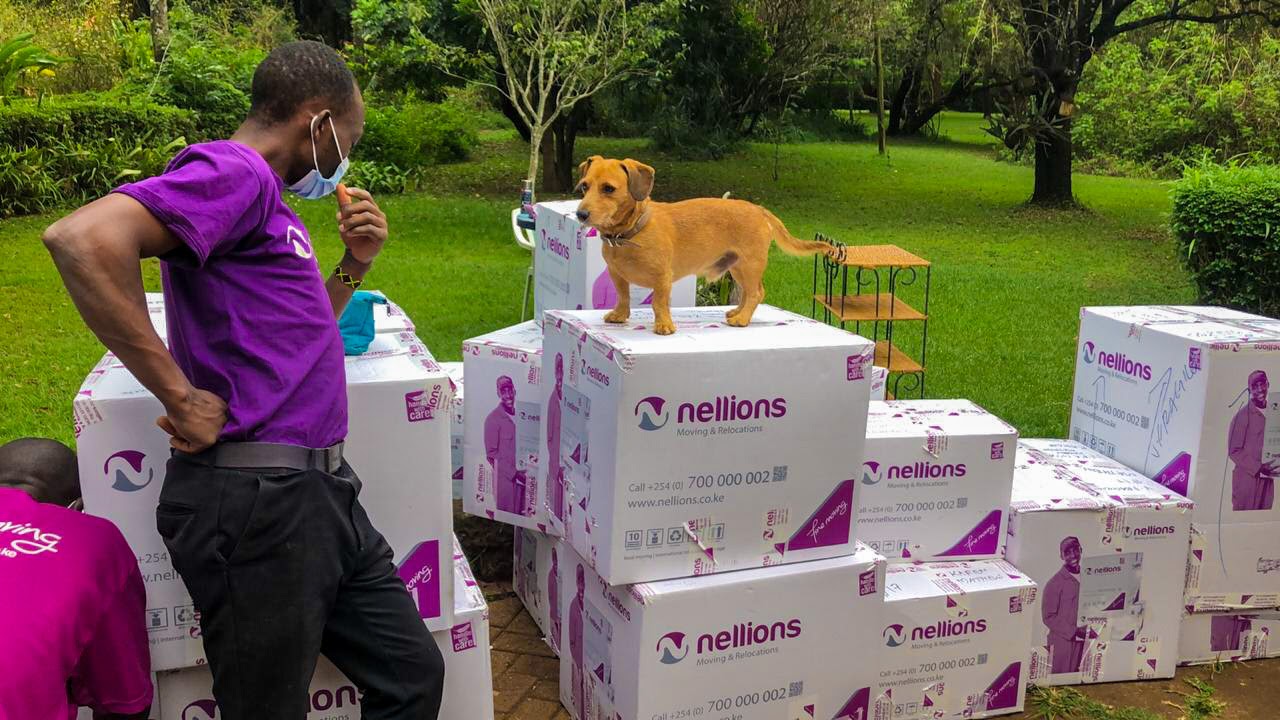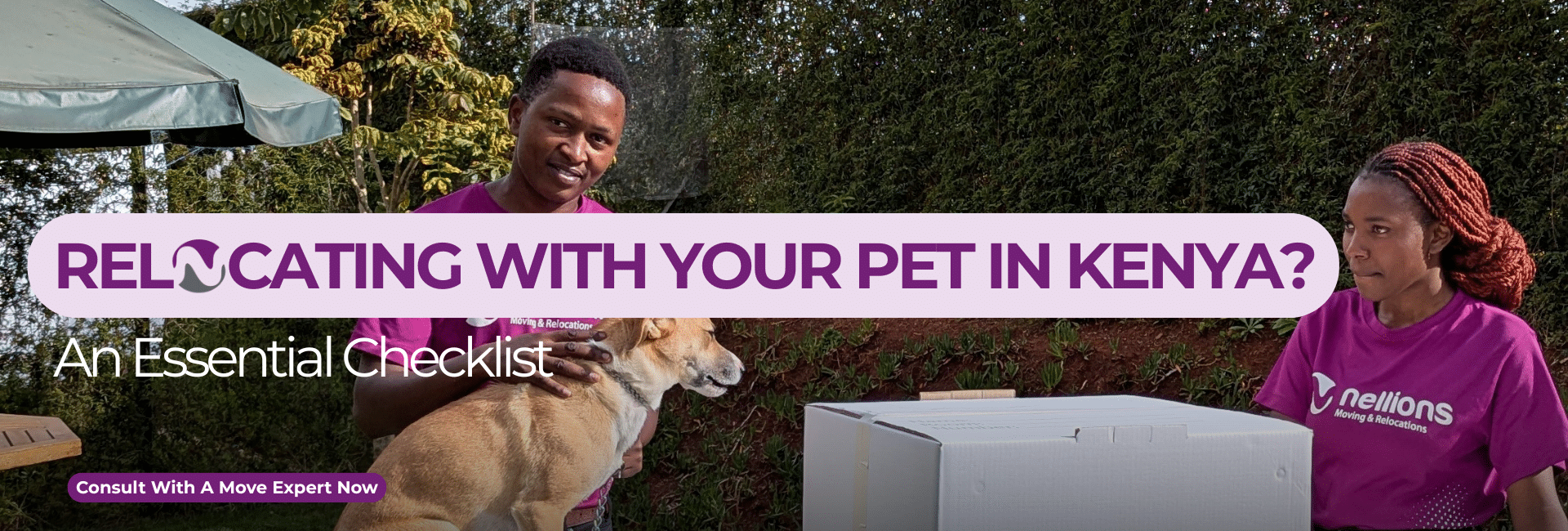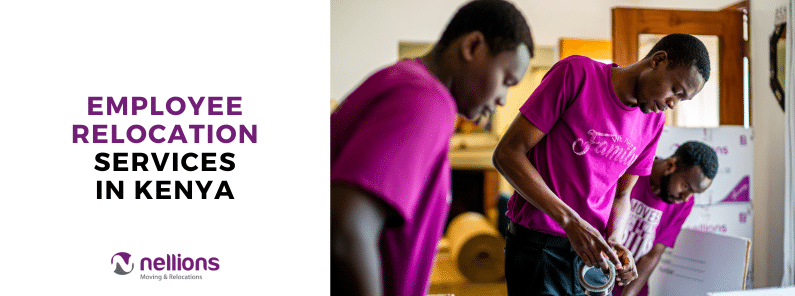For a lot of people, pets are more like family members than domestic animals but when it comes to pet relocation during moving, the process gets very stressful because unlike the rest of your goods, this is a living breathing thing facing an unfamiliar situation.
Needless to say, most household pets are quite delicate and not used to the hardness of travel. Moving pets presents a whole host of challenges, from feeding to comfort, identification, and even insurance. This, combined with the reported cases of pets dying during transport means that it is absolutely paramount that you engage a reputable mover that understands the sensitivities of pet relocation.
In this article, you shall learn:
- Requirements for importation and exportation of pets in Kenya
- The animals recognized as pets in Kenya
- The best pet relocation companies in Kenya
- How to prepare for pet relocation
- The costs you might incur while moving your pet
Your pet’s comfort is essential during the relocation process
Requirements for the importation and exportation of pets in Kenya
i) Pet Microchip
Your pet must be microchipped with a 15-digit, non-encrypted, ISO 11784/11785 compliant pet microchip. You can carry your own microchip scanner if your pet’s microchip is not ISO compatible.
This condition may be waived for animals entering Kenya from rabies-free countries where the pet was born or has lived for a minimum of 6 months.
It is always advisable to bring some sort of identification showing your ownership if your pet travels to a foreign country like Kenya.
ii) Vaccinations
Before entering the country, your pet must be vaccinated for rabies for more than 6 months and less than 12 months. If your dog or cat has been vaccinated against rabies less than six months before arriving in Kenya, it must also be accompanied by a certificate signed by the country of origin’s Government Veterinary Officer confirming that no rabies has occurred within 30 miles of the place of origin.
Kenya recognizes the 3-year Living Avianized vaccine for dogs only.
iii) Rabies Titer Test
A rabies titer test is not required to enter Kenya from any country.
iv) Health Certificate
If travelling from the United States or Canada, USDA- or CFIA-certified veterinarians must complete a Veterinary Certificate for Kenya for approval by the USDA or CFIA. If you are not travelling from any of these nations, the forms should be endorsed by the Governing Body of your country responsible for importing and exporting animals.
v) Import Permit
When entering Kenya with a personal pet, an import permit from the Ministry of Livestock and Fisheries is required.
vi) Ticks and Tapeworm Treatment
A ticks and tapeworm treatment within 48 hours of entry is required for pets entering Kenya.
vii) Entering Kenya by Air
Pets may enter Kenya via Jomo Kenyatta International Airport Pets are expected to arrive as air cargo. For traveling as air cargo, your pet will need an IATA-compliant pet crate. An affidavit is required from the airline captain stating that your pet was on a direct flight to Kenya. Upon arrival in Kenya, the documents are presented and stamped by the veterinary officer posted at the port of entry. When checked at the airport entrance, both domestic dogs and cats must be free of signs of disease communicable to humans. Further inspection by a licensed veterinarian may be needed at your expense if your dog or cat is not in obvious good health.
viii) Puppies and Kittens
Unvaccinated puppies and kittens below 3 months of age can enter Kenya with proof of vaccination from their mother as long as the mother has been vaccinated for rabies within 12 months of giving birth.
ix) Banned Breeds
Kenya does not publish a list of banned breeds.
x) Other Animals
Birds, invertebrates, tropical fish, reptiles, amphibian, mammals such as rodents and rabbits are not subject to requirements of rabies vaccination, but may have to meet other requirements and should have a health certificate to enter Kenya. Pet owners are strongly advised to seek further information from the relevant authority of their country and/or that of the country of destination
xi) CITES
If your animal is not a dog, cat or ferret and, in particular, if it is a turtle or a parrot, you should ensure that it is not protected by the Convention on International Trade in Endangered Species of Wild Fauna and Flora (CITES). If this is the case, you will need to apply for additional permits.
Which animals are recognized as pets in Kenya?
Kenya’s Ministry of Livestock and Fisheries recognizes the following animals as pets:
Cats, dogs, birds, ferrets, [full list to be updated upon conferring with the relevant government authorities].
The Best Pet Relocation Companies in Kenya
The truth is that while a lot of our customers own pets, moving them is a challenge that we’re sadly not adequately equipped to handle. Although this may change in the future, we presently don’t offer pet relocation services, but here’s a few pet relocation companies that operate in Kenya:
Priority Pet Africa
Priority Pet Africa are professionals in pet handling transportation matters. Their aim is to be the most reliable Live Animal Pet Transporter. They use IPATA-approved plastic kennels or custom built IATA approved wooden kennels.
You can expect first-class treatment of your pet as their client, from Vet facilities to air-conditioned collection and delivery vehicles. Comfort is their primary concern, so they always try to book direct flights to keep transit time to a minimum.
In most cases they construct the transit containers to IPATA specifications, but you may use your own if it meets their standards. They are located at Ruaraka, Nairobi.
Yappaville Kenya
Yappaville provides a full package that organizes the transfer of your dog or cat abroad. They are the first Kenyan company to be registered as members of IPATA (International Pet and Animal Transport Association). Beyond pet relocation, they also organize boarding for pets when the owners are travelling. They provide portable kennels and cat enclosures for transport, and even organize group walks and play time for boarding pets.
Pet travel transport
This is an international pet relocation that ships worldwide. It has a USDA endorsement and meets all the IATA requirements. They also help you obtain and complete all necessary paperwork required by the airline and the destination country prior to your pet’s travel date, including USDA endorsement. Whether your pet has special diet or space requirements, their pet transfer specialists will accommodate its unique needs.
When hiring a mover for your pet, engage a mover who assures you that it will be shipped on a direct flight, and one who can account for its location on every step of the journey.
Preparing your pet for relocation
If you are relocating with your pet internationally, here are a few things that you’ll need to do while preparing for your move:
- Closely research the pet import laws in the place that you’re moving
- Get all your documents in order. Check the required documents for the country to which you’re moving.
- Call the airline you intend to travel on and ask about their options and guidelines when it comes to traveling with pets internationally
Costs you will incur during a pet relocation process
You can expect the following costs when moving your pet. All of them don’t always apply, as this depends on the regulations of the country of origin:
- Pet shipping costs
- Clearing agents fees – pets have to be cleared through Kenyan customs
- Pet vaccinations and medical costs
- Pet health certificate costs
- How much does it cost to fly a pet?
- Pet travel crate costs
- Pet regulations by country
- Vaccinations and microchipping
- A pet health certificate or pet passport
- Airline checked baggage or cargo fees
- Buying or renting a travel crate
- Customs charges
- Quarantine fees
- Animal import permit
For a lot of people, pets are family. Your best bet for ensuring that your pet gets to the destination safely and in good condition is by getting qualified professionals to handle your move. Your pet’s comfort is the primary concern, so ensure you reiterate this to your prospective movers and ask detailed questions where necessary. And don’t forget to inform your movers of any special care that your pet may require as well.
Happy moving.













